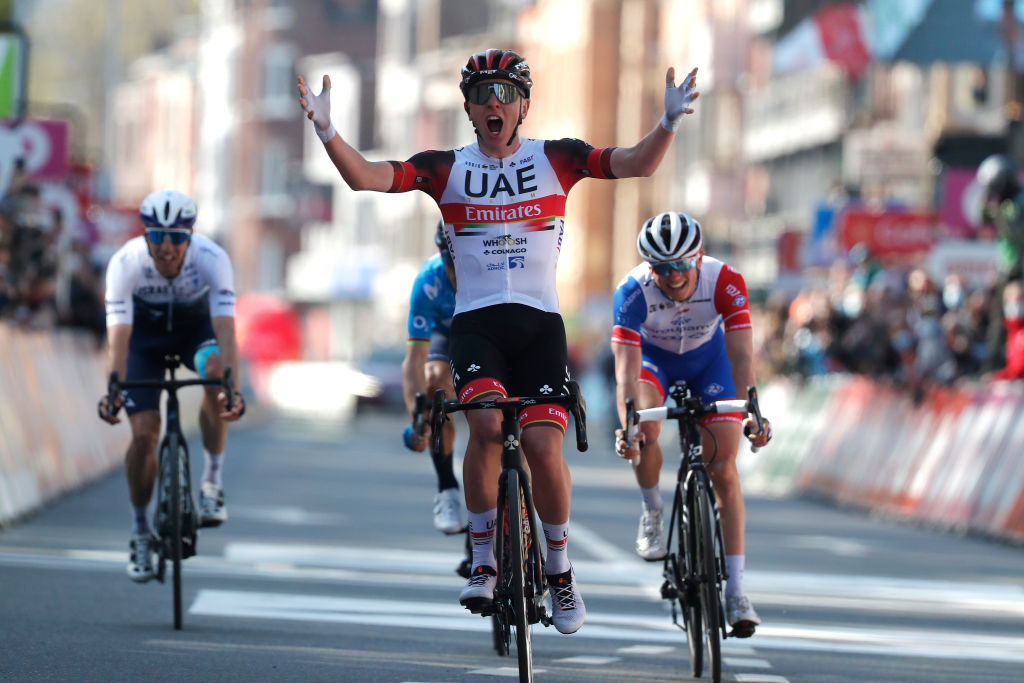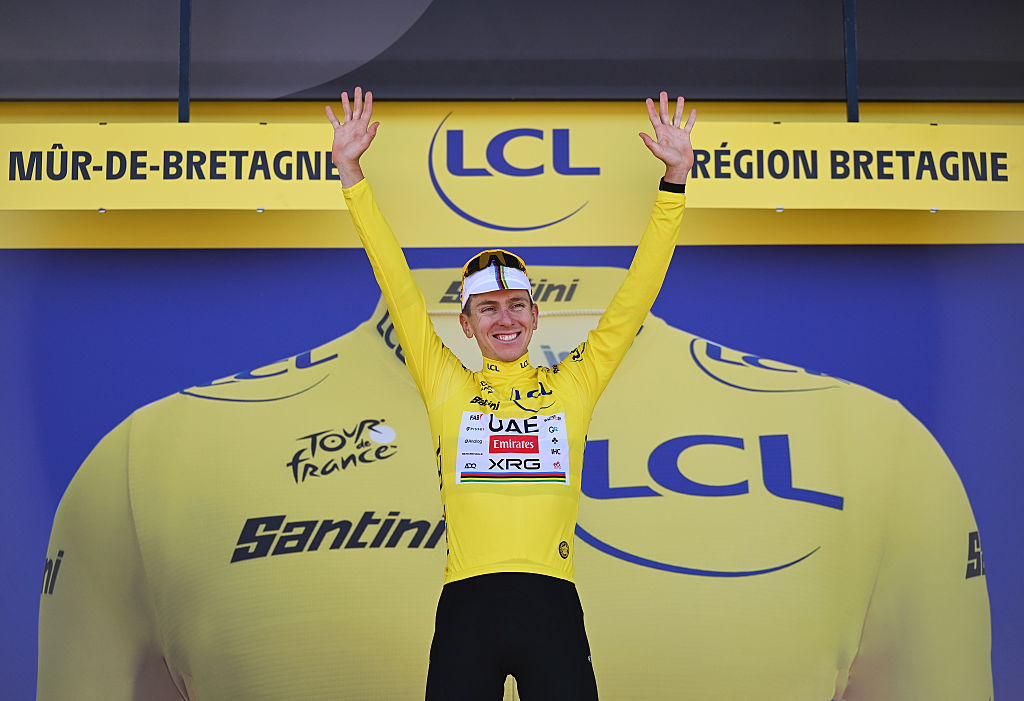Tadej Pogacar hunts for more Classics success at Amstel Gold Race
After his Tour of Flanders dominance, it's hard to see anyone beating the Slovenian on Sunday

How times change. Four years ago, when Tadej Pogačar was interviewed at the start line of the 2019 Amstel Gold Race, he was a neo-pro, about to tackle a race of over 250 kilometres for the first time ever and as he said, “hoping I have enough legs to get to the finish.”
“I’m surprised how well I’ve done this season,” Pogačar said back then, “because going from under-23 to WorldTour is a big difference.” His big 2019 goal, he said, was going to be the now-defunct Tour of California - which he then won.
Fast forward to 2023, and Pogačar’s position in world cycling as he tackles Amstel Gold Race for a second time - after abandoning back in 2019 - could not be more different. Focussing on this season alone, the UAE Team Emirates racer's track record of ten wins and counting, and in particular his latest victory in his most recent event, the Tour of Flanders, make the Slovenian star a clear favourite for next Sunday.
It's good that the Amstel organisers have upgraded their photo finish cameras after two somewhat controversially unclear tight finales in straight yearly succession. But with Pogačar back on the startline in Maastricht, you could be forgiven for wondering if they might as well have saved their money until next April.
It’s symptomatic of Pogaçar’s dominance and versatility as a racer that he completely belies the once oft-repeated argument that riders capable of shining on the cobbled Classics won’t get a look-in at the Ardennes. But it's not just Pogacar, given Amstel Gold has two of the ‘Big Three’ of Flanders already in its palmares - Wout van Aert in 2021 and Mathieu van der Poel in 2019.
If there was a degree of uncertainty about Pogaçar’s ability to deal with the cobbled Classics before 2023, his strength in the hillier one-day races was already beyond question. If he can handle the climbs of Liège-Bastogne-Liège and Il Lombardia, then Amstel Gold Race, more technically demanding but lighter on metres of vertical climbing, falls easily within his Classics racing register.
Neither Van der Poel nor Van Aert are racing on Sunday, nor yet Julian Alaphilippe, with his excellent Ardennes track record, or (to put that rumour to bed for one and for all) the Frenchman's Soudal-QuickStep teammate Remco Evenepoel. But it would be not only disrespectful but a distortion of the truth to see the 2023 Amstel Gold as a one-man race.
Michał Kwiatkowski’s brace of victories and second place in the Netherlands’ top Classic makes him a rider to watch, for one thing, while his Ineos teammate Tom Pidcock’s narrow defeat to Van Aert of two years ago in Amstel means the Briton is another potential threat. Quite apart from Ineos Grenadiers' collectively powerful line-up, Benoît Cosnefroy’s narrow defeat in 2022 to Kwiatkowski and third place in Brabantse Pijl puts the Frenchman in the frame as well.
Outsiders range from Bora-Hansgrohe’s Bob Jungels and his speedy Colombian teammate Sergio Higuita to the ever-dangerous Matej Mohoric (Bahrain Victorious) and Richard Carapaz (EF Education-EasyPost). Neilson Powless’ tremendous ride in Flanders, particularly when combined with a past win in San Sebastian make the American yet another serious option for the Amstel hills. But for all they have serious options, Pogačar remains the key reference point, and his teammate Matteo Trentin, never out of the top 20 in the last three editions, an important foil and/or race captain.
Quite apart from the rivals Pogačar has to get to grips with the Amstel Gold route as well, often seen as the trickiest, most technical of all the Ardennes Classics and - at least on a map - visually the least comprehensible. If we had some pasta for every time in previous Amstel race previews that its technical, twisting course through the Limburg hills has been compared to a plate of spaghetti, then we could open an Italian restaurant.
Food puns apart Amstel is anything but straightforward to predict. The constant modifications to the course finale in recent years by the organisers in a bid to make its most emblematic climb, the Cauberg, less decisive and render the race more open have created some nail-biting finales. The last ‘long-distance’ solo attack dates back to 2013 and Roman Kreuziger, and even that was from only nine kilometres out. Since then, what’s made Amstel hard to read has been the way so many riders have had options until much later into the finale.
It remains to be seen if Pogačar tries one of the attacks from a way out that has netted him wins in races from Flanders to Il Lombardia or opts to gamble on a small group sprint that saw him triumph in Liège in 2021. But what’s beyond question is his ability to master steep learning curves in major races, from major Classics to Grand Tours.
It took Pogačar all of two attempts to win the Tour of Flanders, a race which has defied some of the greatest specialists of all time (Sean Kelly is likely the most famous, although Greg van Avermaet is also in their number), and three attempts for Liège-Bastogne-Liège. As for Il Lombardia, he has won the Classic of Falling Leaves both times he has taken part.
If he were to take Amstel on his second attempt, at this point in the season, then, it would be anything but surprising. But that's no guarantee, of course, of actual success. As Pogačar put it back at his first Amstel Gold of 2019, “the season has been pretty great for me so far, but today is another race and we’ll see how it goes."
The latest race content, interviews, features, reviews and expert buying guides, direct to your inbox!
Alasdair Fotheringham has been reporting on cycling since 1991. He has covered every Tour de France since 1992 bar one, as well as numerous other bike races of all shapes and sizes, ranging from the Olympic Games in 2008 to the now sadly defunct Subida a Urkiola hill climb in Spain. As well as working for Cyclingnews, he has also written for The Independent, The Guardian, ProCycling, The Express and Reuters.
Latest on Cyclingnews
-
As it happened: Yellow jersey changes hand while GC shaken up by crash on stage 7 of the Tour de France
A rolling 197km stage from Saint Malo to the Mûr-de-Bretagne awaits the peloton with a slender margin at the top of the GC standings -
Tour de France stage 7: Tadej Pogačar tops Jonas Vingegaard to win on Mûr-de-Bretagne
World champion back in maillot jaune as Mathieu van der Poel can't hold GC contenders' pace -
The current GC standings at the Tour de France 2025
Tadej Pogačar reclaims yellow after Mûr-de-Bretagne victory -
Giro d'Italia Women stage 6: Liane Lippert takes first victory in a year as Pauliena Rooijakkers makes GC gains
German rider beats Dutch rider in two-up sprint to the line, as Shirin van Anrooij comes home in third



